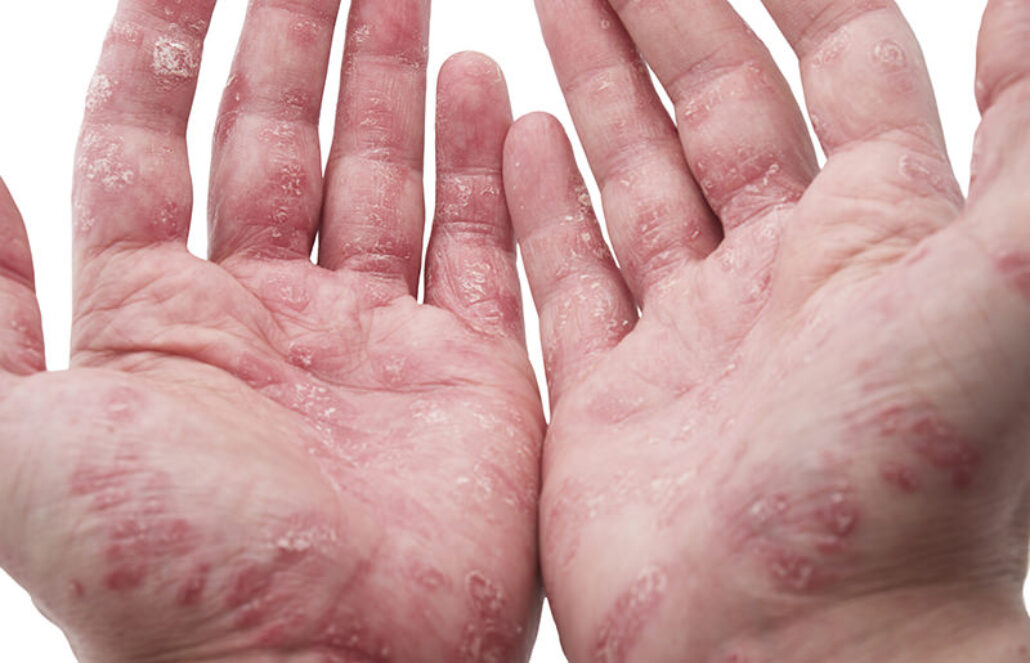You may know psoriasis as an unsightly skin condition, but did you know that this skin problem can lead to joint damage?
Arthritis is commonly understood as a painful joint problem. Many people do not realize that there are more than one hundred different causes of arthritis, and as many different treatment approaches. In order to maximize treatment effectiveness, the treatment must be tailored to the cause of the joint pain.
One type of arthritis affects about one-third of people who have psoriasis, a skin condition characterized by red scaly patches. Most people affected develop the skin condition first, but joint problems can begin before the skin lesions appear. In both psoriasis and psoriatic arthritis, symptoms may appear periodically, followed by periods of remission.
There is no cure for psoriatic arthritis. Treatment is important to avoid chronic disabling consequences over time, and focuses on controlling symptoms and preventing damage to joints.
Psoriatic arthritis can affect joints on just one side of the body or on both sides. Any part of the body is vulnerable, including the fingertips and the spine. The signs and symptoms often resemble those of rheumatoid arthritis, including pain, stiffness, swelling, and joints that are warm to the touch. These symptoms range from relatively mild to severe. In addition, psoriatic arthritis is more likely to cause the following symptoms:
- Swollen fingers and toes. Painful, sausage-like swelling is one sign of psoriatic arthritis. Some people also develop deformities in hands and feet before experiencing significant joint symptoms.
- Foot pain. Psoriatic arthritis may affect the areas where tendons and ligaments attach to bones—particularly at the back of the heel or in the sole of the foot.
- Lower back pain. A condition called spondylitis is related to psoriatic arthritis, and causes inflammation of the joints between the vertebrae of the spine and the points between the spine and pelvis.
People with psoriasis are encouraged to consult their physician if they develop joint pain. With medication, inflammation can be controlled, and joint disability can be prevented. In some cases, surgical procedures may also be appropriate to control inflammation or replace severely damaged joints.
When to seek treatment for your arthritis
Arthritis doesn’t have to spell the end of an active life. If you are experiencing worrisome symptoms or persistent pain, the renowned arthritis specialists at Summit Orthopedics can help. We work with you to confirm a diagnosis and develop an appropriate conservative treatment plan. If nonsurgical treatments fail to support your lifestyle goals, fellowship-trained orthopedic surgeons will consult with you and discuss appropriate surgical options. Summit is home to innovative joint replacement options. Our Vadnais Heights Surgery Center is one of only two surgery centers nationally to receive The Joint Commission’s Advanced Certification for Total Hip and Total Knee Replacement.
Start your journey to healthier joints. Find your arthritis expert, request an appointment online, or call us at (651) 968–5201 to schedule a consultation.
Summit has convenient locations across the Minneapolis-St. Paul metro area, serving Minnesota and western Wisconsin. We have state-of-the-art centers for comprehensive orthopedic care in Eagan, MN, Plymouth, MN, Vadnais Heights, MN, and Woodbury, MN, as well as additional community clinics throughout the metro and southern Minnesota.
